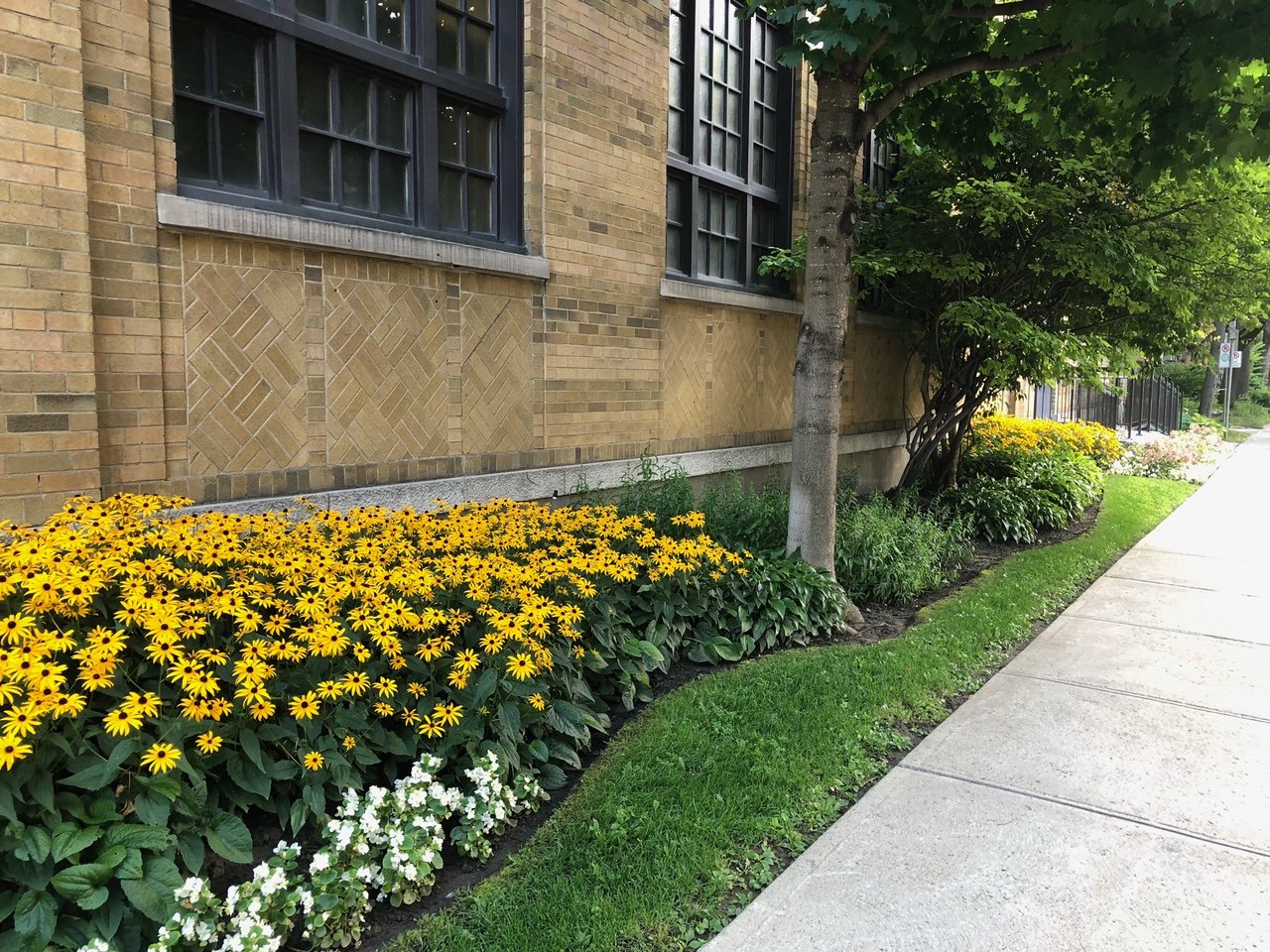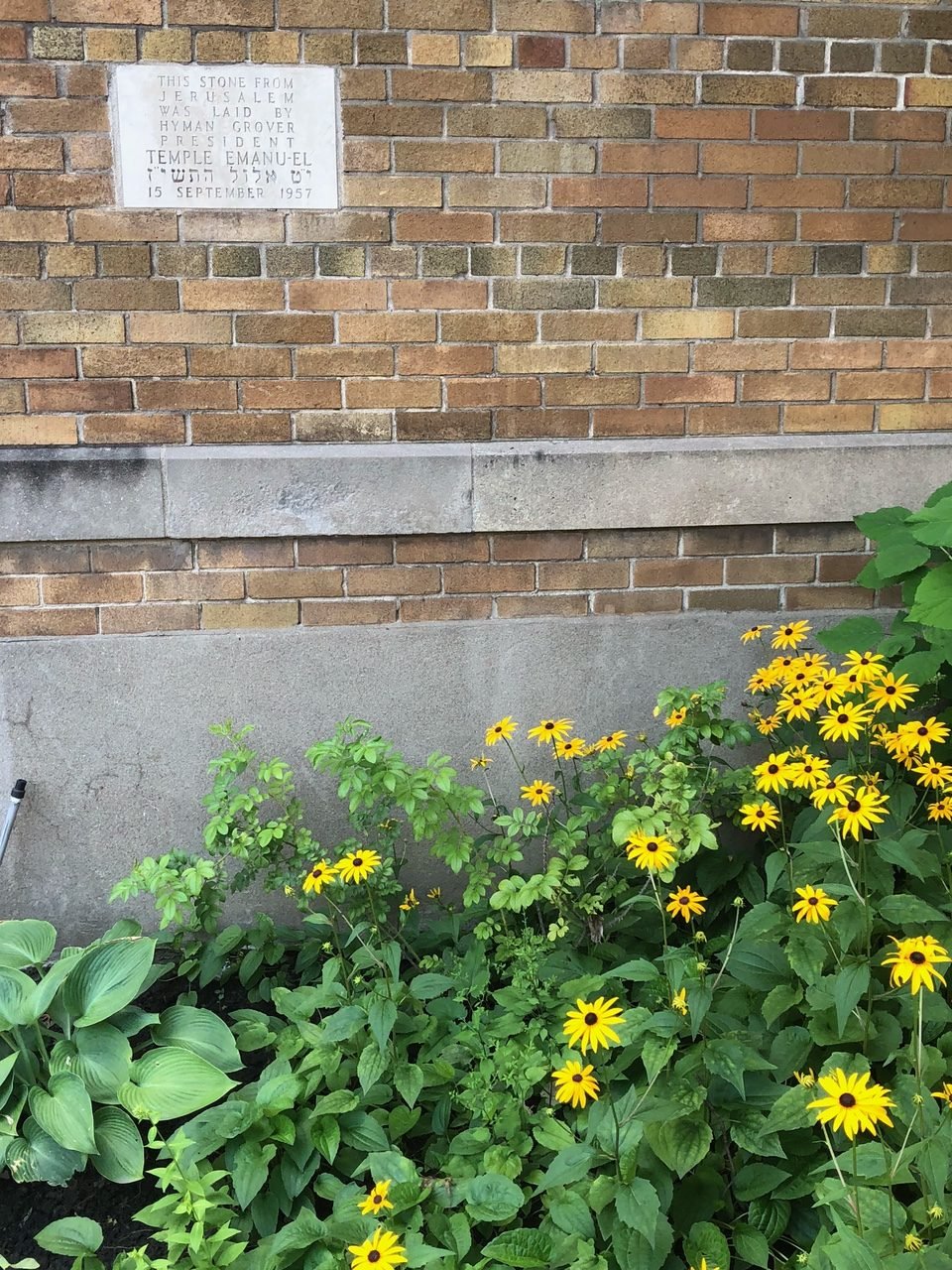Synagogues are Ditching the Paper Plates and Installing Solar Panels as They Make Environmentally Conscious Choices
The Canadian Jewish News | February 6, 2023 | Ellin Bessner
The pollinator garden at Montreal's Temple Emanu-El Beth Sholom
To mark Tu b’Shevat, close to 85 people sat down to a kosher vegan Shabbat dinner at Vancouver’s Schara Tzedeck synagogue on Friday, Feb. 3. The chef brought the mushrooms, the potatoes and the fruit from local sources. As for the plates, they were reusable, not disposable.
Then four community leaders led a discussion about environmental awareness and the deep connection Jews share with nature.
The program is part of a year-long commitment by Vancouver’s historic Orthodox congregation to be more environmentally sustainable, according to Rabbi Shlomo Schachter.
“Vancouver is one of the greenest cities, certainly in North America, and in the world. And we had a sense of our community sort of lagging during COVID,” Rabbi Schachter said, in an interview with The CJN Daily. “We’re dealing with single-use paper and plastic. And we were doing all of these things, and I said, ‘Look, we really don’t need to be doing that.’”
Year-long sustainability project
That’s why the synagogue signed on last spring, when Vancouver’s Jewish Federation came calling. Schara Tzedeck joined more than a dozen local Jewish sites in B.C. for a year-long sustainability challenge under the auspices of Hazon, an American environmental charity.
The 14 Vancouver-area sites are part of the first Canadian cohort for Hazon’s “Seal of Sustainability” project. This session wraps up in March.
Other area participants include all three day schools—King David High School, Richmond Jewish Day School, and Vancouver Talmud Torah—plus five synagogues including Schara Tzedeck, Beth Israel, Beth Tikvah, Or Shalom, and Temple Shalom.x-
The JCCs of Greater Vancouver, and White Rock South Surrey are in, too, as are Camp Miriam, Hillel BC, the Jewish Federation and Jewish Family Services.
“The whole cohort has been inspiring to work with. They have brought great passion and commitment to the work,” wrote Bruce Spierer, Hazon’s program manager, in an email.
The Canadian sites each had to set up “green teams,” which then also met regularly as a cohort to share ideas and successes. At the end of the process, Hazon awards them a “Seal of Sustainability” which they can use on their websites. In the past six years, over 200 sites in the United States have completed the program
Some of the initiatives carried out by the cohort included a clothing swap at the White Rock South Surrey JCC, a rain garden at the Richmond Jewish Day School, and an expanded composting program at the Vancouver Federation building, while their daycare has acquired worms to teach children about composting.
Solar panels on the wish list
The interior of Vancouver’s Schara Tzedeck synagogue is lit with LED lights, saving 80 % in energy load, according to the congregation’s sustainability committee. (Rabbi Shlomo Schachter photo.)
At Schara Tzedeck, the 75-year-old building has been undergoing renovations to become more energy efficient. The work included new boilers, some heat pumps, a new roof, low-flush toilets in the bathrooms, and LED lights installed in the sanctuary.
“ I believe that it has dropped the electrical load on them by 80 percent,” said Ariel Greene, who is Schara Tzedeck’s sustainability committee chair (and yes, he does get teased about his last name).
The shul’s Rabbi Schachter has his sights set on the next major project: installing solar panels on the Schara Tzedeck roof, which he expects could generate enough green power to heat the mikveh, and maybe even put some energy back into the provincial power grid.
While support for environment-conscious policies are usually associated with more progressive branches of Judaism, Rabbi Schachter argues that Orthodox congregations like his are simply doubling down on the fundamental principles of the Torah, including tikkun olam.
“If we understand that the will to take care of our planet is just as much part of God’s will as some of the other areas of halakhah, so this becomes an imperative that we need to answer the bell. And we have. And that’s just been the beginning of it,” he explained.
Pollinator gardens and outdoor services
The Temple Emanu-El-Beth Sholom pollinator garden is part of the B-line, a Montreal interfaith project involving places of worship along a corridor from East to West. (Rabbi Lisa Grushcow photo)
With the Vancouver cohort about to wrap up, Hazon’s next Canadian group begins their year-long journey in March, although the name of the program has changed to Jewish Climate Leadership Coalition. Temple Emanu-El-Beth Sholom in Montreal is one of the Class of 2024, along with ten other sites in Ontario and Alberta.
“Since coming back to activities in the building [after COVID], we have also transitioned to non-disposable dishes, silverware, cups and mugs for all our activities, to be more environmentally sound,” said Rabbi Lisa Grushcow, adding that the synagogue had already planted a pollinator garden around the building to attract birds, bees and butterflies.
Their 2023 “Go Green” capital building fund campaign is seeking $3 million to renovate the structure.
Of particular urgency is converting the temple’s heating system to electricity. They hope to install a solar thermal wall that will preheat fresh air. According to the synagogue, this “is projected to save at least 11.5 tons of greenhouse gases per year” while improving ventilation.
Calgary’s Temple B’nai Tikvah will have solar panels installed on the roof of the synagogue later this year, which should provide enough green energy to fill more than 30 per cent of the building’s needs. A local energy cooperative, Bow Valley Renewable Energy, will build and install the solar panels, and sell the power back to the shul at reasonable rates.
Peter Driftmier, who heads B’nai Tikvah’s environmental committee, said going solar was something they have long wanted to do in a province that gets 89 percent of its electricity from burning fossil fuels such as coal and natural gas.
“We decided to take this action after many years of informal discussions wishing we could go solar. Our congregation members care deeply about our Jewish community and our local, provincial, and federal communities all taking action on the climate crisis in a way that responds to the urgency of emissions reductions,” he said.
“We hope that more synagogues build solar on their roofs and I hope that more Canadian Jews join renewable energy cooperatives,” Driftmeir said.
First Narayever in Toronto
With the Calgary site still working out the arrangements and eventual installation date for its solar panels, it appears that Toronto’s First Narayever congregation may be the first synagogue in Canada to actually have them up and running.
After a two-year-long renovation to their 120-year-old heritage building on Brunswick Avenue, the downtown Toronto synagogue reopened Feb. 3 with a more energy-efficient, and accessible site.
The historic Toronto First Narayever Congregation installed solar panels on the roof of it’s newly renovated 120-year old building in downtown Toronto. (Ed Elkin photo)
“We have an array of brand-new solar panels on the roof that are already generating green power,” said Rabbi Ed Elkin, explaining that the congregation received a loan from the City of Toronto to help them incorporate the panels into the renovation.
Aside from the panels, the restored building has better insulation, sustainable lighting, and efficient appliances. What’s more, the contractor didn’t throw the old bricks away–they were reused.
Several Toronto synagogues have incorporated green design into their earlier renovation projects, especially the city’s oldest congregation, Holy Blossom Temple. The atrium boasts a living wall as a focal point.
As well, Holy Blossom has motion sensors in the lights in the office spaces, plus special light switches have been installed that give users more control over when they turn on and off, said Rabbi Yael Splansky.
Montreal’s main Jewish federation building, known as the Cummings House, underwent a green upgrade about 12 years ago, and received a BOMA certification, according to Glenn Nashen, director of media relations for Federation CJA. At the time, he said they installed LED lights, stopped using paper plates during meetings, and engaged the wider Jewish community in a series of Town Halls.
“While the pandemic may have shifted priorities over the last few years we will surely return to these important initiatives,” Nashen said, in an email.
Edmonton’s Temple Beth Ora dug a rain garden last summer at the site of the city’s Talmud Torah school, as part of its efforts to be more conscious of sustainability. This comes on top of the Reform congregation’s existing kosher food policy, adopted in 2019, that frowns upon single-use plastics but also requires ethical choices when any food is brought into the premises.
The living wall is the focal point of the atrium in the Holy Blossom Temple’s newly renovated site in Toronto. (Nelawlivingwall.com photo)
Weather permitting, Beth Ora’s rabbi, Gila Caine, holds services outside in “what I like calling the ‘outdoor shul’,” she said.
This encourages members to remember the outdoor world is also sacred.
It’s a sentiment that Vancouver’s rabbi, Shlomo Schachter shares, even though he comes at it from the modern Orthodox perspective.
However, he feels that the sense of urgency to do something about climate change may be more top of mind for people in B.C., a province that has endured forest fires, damaging floods, and deadly heat domes in the past two years.
“Yeah, it just makes it very real. You see climate change happening here. You see little things, like, when we had the problem with the roads and the flooding, the supermarket didn’t have yogurt for a week,” Schachter recalled.
Ariel Greene, the head of the sustainability committee, agrees.
“I’m hesitant to say that it was a good thing. But anything that can help promote awareness has some type of positive aspect.”
Why Orthodox are slower to change
Despite the tangible evidence of climate change in the Vancouver area, Schara Tzedeck is the only Orthodox congregation taking part in the Hazon Seal of Sustainability program. The ultra-Orthodox Chabad schools and synagogues are not involved, according to a spokesperson for Vancouver’s Jewish Federation.
Rabbi Schachter chalks it up to a reluctance on the part of Orthodox Jews to deviate from long-standing practices, in the face of a changing world.
“I think there’s a sense in many Orthodox communities that Judaism is hard enough without having new problems. And the sense that God gave us the Torah, and if we didn’t have these laws about not using paper plates before, so they must not be that important, right?” he explained, calling it an unfortunate, unnecessary response.
He argues that saving the planet is actually embedded in the Torah, so paying attention to the environment could help Orthodox Jews gain new understanding of the scriptures, in a custom known as expanding the Torah, which is considered a blessing.
“My sense is one day it will be clear that there’s a halakhic prohibition to pollute and to do things that are detrimental to the entire earth. We haven’t yet evolved those opinions and they haven’t become articulated, but I think they will.”
‘Best vegetarian cholent this side of the Mississippi’
For Ariel Greene, the biggest challenge he’s faced towards steering the 500-member Schara Tzedeck congregation towards achieving Hazon’s Seal of Sustainability has been convincing people to come out on a cool February Friday night for a vegan Tu b’Shevat meal.
It was hard work, he said. And as often happens with Jewish functions, too many people waited until the very last minute to reserve tickets, and he had to turn them away in order to comply with the caterer’s deadline.
But otherwise, the pareve cholent is catching on at Sabbath kiddush, Rabbi Schachter said, as is the switch from disposable dishes to reusable ones that need to be washed.
“Well, our kiddush is very well liked. We have the best veggie cholent this side of the Mississippi. That’s what they say,” Schachter quipped.





